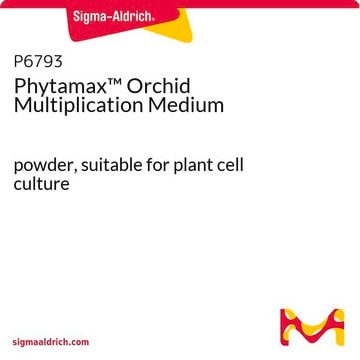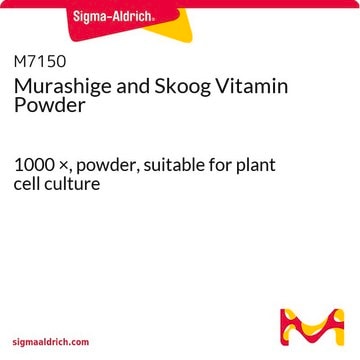C5915
Coconut water
suitable for plant cell culture
Synonym(s):
Coconut beverage, Coconut extract, Coconut juice
Sign Into View Organizational & Contract Pricing
All Photos(1)
About This Item
UNSPSC Code:
10171502
NACRES:
NA.72
Recommended Products
sterility
sterile-filtered
Quality Level
form
solution
technique(s)
cell culture | plant: suitable
application(s)
agriculture
shipped in
dry ice
storage temp.
−20°C
Application
Coconut water is used as a supplement with plant cell culture media such as Murashige & Skoog media.
Use at a concentration of 5-20% (v/v)
Other Notes
Coconut water has been shown to stimulate shoot proliferation in many species of plants. It is prepared from selected coconuts and processed to remove most of the protein. The product is then filter sterilized and frozen prior to shipment. Remaining protein levels in the water may vary from one lot to the next and may result in precipitate when the product is frozen. This precipitation should not effect the growth of the plant tissue. The precipitate can be removed by filtering or by allowing it to settle to the bottom of the bottle and then decanting. Coconut water can be divided into smaller aliquots, corresponding to your standard medium batch size, and refrozen until needed. Coconut water should be used at a concentration of 5-20% (v/v).
Preparation Note
Material is deproteinized
Storage Class Code
10 - Combustible liquids
WGK
WGK 3
Flash Point(F)
Not applicable
Flash Point(C)
Not applicable
Personal Protective Equipment
dust mask type N95 (US), Eyeshields, Gloves
Choose from one of the most recent versions:
Already Own This Product?
Find documentation for the products that you have recently purchased in the Document Library.
Customers Also Viewed
Porntip Wongkaew et al.
Plant cell reports, 23(6), 426-434 (2004-08-17)
Sugarcane white leaf (SCWL)-diseased sugarcane plants collected from Udornthani Province, in north-eastern Thailand, were the source for tissue culture experiments. Explants from axillary buds, meristem tips, and leaves grew optimally in Murashige-Skoog medium containing 0.5 mg/l alpha-naphthaleneacetic acid, 0.5 mg/l
K P Martin et al.
Indian journal of experimental biology, 43(3), 280-285 (2005-04-09)
Large-scale in vitro propagation protocol for Dendrobium hybrids Sonia 17 and 28, two highly prized commercial cut flower cultivars through shoot multiplication using flower stalk node explants and protocorm-like bodies (PLBs) formation was accomplished. Both hybrids did not exhibit significant
Sungkumlong et al.
Indian journal of experimental biology, 46(4), 243-248 (2008-06-03)
In vitro mass production of C. suaveolens (Lindl.) Hook, an endangered orchid with its snowy white flowers having horticultural potential was accomplished through immature seed culture, and subsequent plant regeneration. The developmental stage of the immature seeds and nutrient media
Suvi T Häkkinen et al.
Plant cell reports, 39(12), 1655-1668 (2020-09-07)
Sustainability and safety aspects of plant cell cultures as food are presented. Applicability of dairy side streams as carbon source and use of natural growth enhancers in cultivation are shown. Biotechnologically produced cellular products are currently emerging to replace and
Protocols
Preparation from Packaged Powder, Preparation from Basal Salt Solutions, Banana Powder Preparation and Use, Coconut Water Preparation and Use
Our team of scientists has experience in all areas of research including Life Science, Material Science, Chemical Synthesis, Chromatography, Analytical and many others.
Contact Technical Service

















